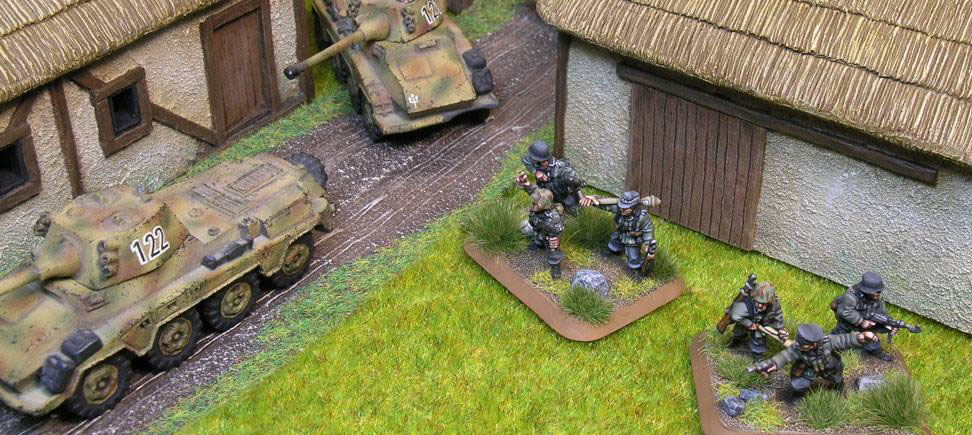We’ve prepared a simple document where you can find a painting guide about World War Two Germans, based on the new Open Fire box miniatures from Battlefront (Flames of War). Inside you can find a step by step guide, a color chart, and lots of tips!.
PAINTING GUIDE STEP BY STEP
Step 1 – Apply primer. I prefer to use black primer because I can use it when I do the profiling. In this case I’ve use a brush. But it’s always better to use an airbrush or spray, because the layer of paint is thinner and more homogeneous.
 Step 2 – Apply base colors. We paint the trousers with Dark grey 862 (Vallejo) and the jacket with German Camo Extra Dark Green 896 (Vallejo). Remember, it’s recommendable to dilute the paint with water, because you can handle it easier.
Step 2 – Apply base colors. We paint the trousers with Dark grey 862 (Vallejo) and the jacket with German Camo Extra Dark Green 896 (Vallejo). Remember, it’s recommendable to dilute the paint with water, because you can handle it easier.
 Step 3 – Apply lights. We work the trousers with Dark bluegrey 867 (Vallejo) first and continue with Ivory 918 (Vallejo) or white. And we work jacket with German Fieldgrey WWII 830 first and then by mixing this color with Ivory or white. I usually apply 4-5 lights, but you can apply as many as you want, until you get a good contrast. Anyway, once again, I recommend working with diluted paints! Therefore transitions will be smoother.
Step 3 – Apply lights. We work the trousers with Dark bluegrey 867 (Vallejo) first and continue with Ivory 918 (Vallejo) or white. And we work jacket with German Fieldgrey WWII 830 first and then by mixing this color with Ivory or white. I usually apply 4-5 lights, but you can apply as many as you want, until you get a good contrast. Anyway, once again, I recommend working with diluted paints! Therefore transitions will be smoother.

Step 4 – Apply a profiling with black. When I apply a profiling I paint a thin line in order to “separate” each element of the miniature. You should use a thin brush and diluted paint, and I usually use black, but you can use any other dark color. This step could be very unreal, but it’s a very interesting resource in this scale, because we win a lot of contrast.
 Step 5 – Paint details. We paint the different details. For instance, I’ve used the following colors:
Step 5 – Paint details. We paint the different details. For instance, I’ve used the following colors:
- Puches, bags, canteen, etc: Dark oxide 302 (Vallejo, Panzer aces)
- Leggins, gasmask cover: Germ. C. Extra Dark Green 896 (Vallejo)
- Poncho: English uniform 921 (Vallejo)
- Rifle: Flat brown 982 (Vallejo) and Gunmetal grey 863 (Vallejo)
- Panzerfaust: English uniform 921 (Vallejo) or Desert yellow 977 (Vallejo)
- Wood (pale, stielgrenate, etc): Desert yellow 977

Step 6 – Apply lights on details. Generally we can use Ivory or white to light all colors, except for Dark oxide and flat brown. In this kind of browns, red browns, I prefer to use a lighter color. For example, I usually use this scheme: Dark oxide 302 > Flat brown 862 > Orange brown 981. So, to paint pouches, etc, we can use only flat brown like light, and when we paint the Rifle, we can use first flat brown, and then, orange brown. Anyway, you can use any other combination!.

Step 7 – Apply a profiling with black. Once again, we apply a profiling, but this time on the details. And like the first profiling, this step is very important, because we can get more and more contrast!

Step 8 – Finally, we paint the skin. I usually use Flat brown 982 as the shadow color. Then, I apply the general base with Tan 066 (Vallejo, GameColor). This general base imply leaving some shadow lines, to simulate the facial expression. Then, we apply Dwarf Skin 041 (Vallejo, GameColor) in several layers, and finally we apply the maximum light by mixing Dwarf skin and white.
 If you are interested, you can find a more complete guide, plenty of other painting tips, and information about how to paint Germans, in the recently published magazine PaintingWar: WWII German Army in Campaign.
If you are interested, you can find a more complete guide, plenty of other painting tips, and information about how to paint Germans, in the recently published magazine PaintingWar: WWII German Army in Campaign.
 And we have prepare a document in PDF with the painting guide for you!
And we have prepare a document in PDF with the painting guide for you!
You can download it by right-clicking on the image and choosing ‘Download file/link as‘:



Excellent tutorial Ruben!
CdlT
Stunning work, thank you.
Directo a bajar y después al drop… 😛
It says dark grey but the code is 862 which is black grey for the trousers. Which color is supposed to be used, and if dark grey what are some alternatives for it. Thank you going to pick up book ASAP those minis look amazing!
Whta primer do you use? My black Army painter is a little bit glossy.
I usually use primers from Ammo of Mig. It isn’t a spray, you need an airbrush to apply them, but it’s worth it!.
Your article helped me a lot, is there any more related content? Thanks!